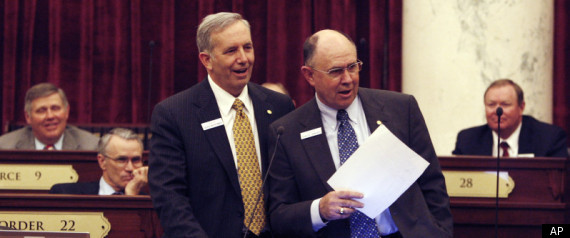I saw this story yesterday on the SF Chronicle website. I expected to see it picked up in other papers, but I suppose I am naive because I’ve seen nothing. This isn’t surprising, because as a people we have abdicated our freedoms in an almost unprecedented way to the Bush administration; the next logical step is detaining and interning dark, dusky looking people who aren’t born-again Christians or who have political views contrary to those held by the Great Leader.
Under the Bush administration and his fellow faux-Republicans, we’ve become no better than the Soviet Union. Except that we have plenty of toilet paper and only stand in lines to buy slick new cellphones.
Feds give customs agents free hand to seize travelers’ documents
Bob Egelko, Chronicle Staff Writer
Wednesday, September 24, 2008(09-23) 17:06 PDT SAN FRANCISCO — The Bush administration has overturned a 22-year-old policy and now allows customs agents to seize, read and copy documents from travelers at airports and borders without suspicion of wrongdoing, civil rights lawyers in San Francisco said Tuesday in releasing records obtained in a lawsuit.
The records also indicate that the government gives customs agents unlimited authority to question travelers about their religious beliefs and political opinions, said lawyers from the Asian Law Caucus and the Electronic Frontier Foundation. They said they had asked the Department of Homeland Security for details of any policy that would guide or limit such questioning and received no reply.
“We’re concerned that people of South Asian or Muslim-looking background are being targeted inappropriately” for questioning and searches, said Asian Law Caucus attorney Shirin Sinnar.
Amy Kudwa, spokeswoman for the Department of Homeland Security, said the new policies reflect “the realities of the post-9/11 environment.”
Kudwa noted that courts have allowed federal agents more leeway in searches at borders and airports than elsewhere. She also said customs agents are entitled to ask questions that “may be relevant to admissibility determinations that relate to an alien’s purpose for entering the United States” under certain types of visas.
The Bay Area legal groups filed a Freedom of Information Act suit against the government in February, seeking documents on the policies that govern searches and questioning of international travelers.
The organizations said they had received more than 20 complaints in the previous year, mostly from South Asians and Muslims. The travelers said customs agents regularly singled them out when they returned from abroad, looked at their papers and laptop computers, and asked them such questions as whom they had seen on their trips, whether they attended mosques and whether they hated the U.S. government.
Homeland Security’s customs and border protection division provided 661 pages of documents in response to the suit, but blacked out portions of many records and withheld others, Sinnar said. She said the legal groups would return to court to seek more documents.
In the meantime, the customs agency publicly released its policies on border searches in July, including a statement that agents are authorized to “read and analyze” any documents in a traveler’s possession and keep them for a reasonable time to make copies.
What the agency didn’t announce – but what the documents obtained in the lawsuits reveal – is that the current practices represent a substantial change from earlier government policies, Sinnar said.
She said those policies were first enacted by President Ronald Reagan’s administration in 1986, in response to lawsuits by U.S. citizens who were questioned and searched after returning from Nicaragua. President Bill Clinton’s administration refined the policies in 2000 but made no major changes, Sinnar said.
Those policies allowed customs agents to glance at travelers’ documents to see if they contained anything the agents were authorized to intercept – such as smuggled currency or obscene material – but required agents to have grounds for reasonable suspicion before taking and reading any documents, the legal groups said, quoting the newly released records.
The 1986 and 2000 policies required agents to meet a more-demanding standard – showing evidence that contained probable cause of smuggling or other wrongdoing – before copying documents, the lawyers’ groups said.
“For more than 20 years, the government implicitly recognized that reading and copying the letters, diaries, and personal papers of travelers without reason would chill Americans’ right to free speech and free expression,” Sinnar said. “But now customs officials can probe into the thoughts and lives of ordinary travelers without any suspicion at all.”
Read the documents
The government documents and the legal groups’ analysis of them are available at:
http://links.sfgate.com/ZEXO
